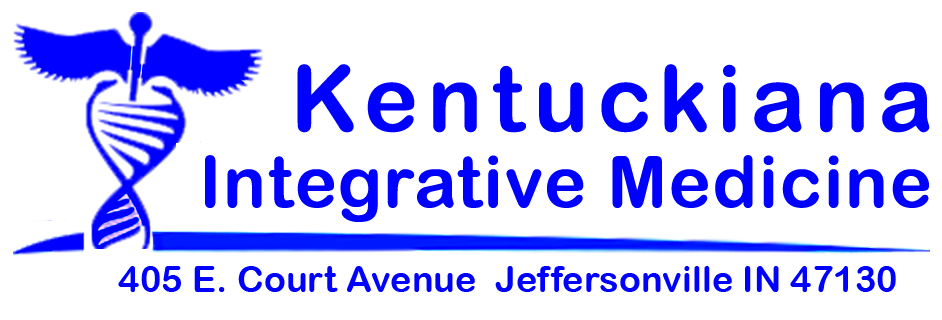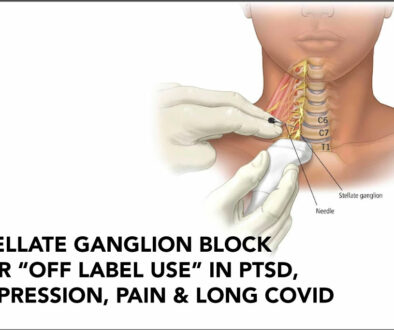Why Choose Kentuckiana Integrative Medicine-Kentuckiana Ketamine Institute?

- Philosophy & Proprietary Therapies offered by no other clinics that we know of.
- We believe that our proprietary 5R approach has the capacity to Reset, Reconnect, Recharge, Replenish, and Realign your Mind, Spirit, and Body through a multitude of treatment approaches that have dramatically improved our treatment success. Our proprietary blends contain ingredients proven to benefit the body, especially the nervous system, brain, and mitochondria [the mitochondria are the powerhouses that make ATP or energy.] Numerous PubMed and NIH research studies demonstrate the benefits of Magnesium, B Vitamins, Vitamin C, Ozone in assisting the body’s own self-healing mechanisms and they do not require double-blind placebo control studies. Evidence-based Medicine proving benefits in patients through concrete data represents powerful science.
- SAFETY: Your treatment is always provided by an extremely experienced physician who used Ketamine extensively during his work in Emergency Medicine and Anesthesia. Dr. Cruz has over 30 years of clinical experience and is a leader and educator of Integrative Medicine. You are thoroughly monitored with 1:1 attention. In 8 years, we have had no serious adverse effects; however, we are fully prepared with a defibrillator, advanced airway equipment and medications to control blood pressure and heart rate and any other rare side effects.
- EXPERIENCE: Kentuckiana Ketamine Institute is one of the most experienced clinics in the area. In Kentuckiana, we were first to introduce Ketamine for Mental Health problems, Addictions and CRPS – Complex Regional Pain Syndrome with over 8 years of delivering care 24/7 as opposed to the part-time Ketamine services offered by some other clinics.
- QUALITY: Your treating physician is clinically very experienced -30 years in practice Emergency Medicine, Anesthesia, Integrative and Regenerative Medicine. Dr. Cruz has experienced severe depression personally and will compassionately share with you the additional tools and skills you need to not need ketamine as you conquer your pain and emotional and mental health challenges. You will be provided with a comprehensive program that will help you get the most out of your ketamine therapy. Very few clinics provide these additional tools and strategies.
- COMFORT: Private beautiful rooms with blankets and complete monitoring. Dr. Cruz’s medical team has been personally trained by him and they are caring, compassionate and very skilled at IV therapy. You will be in a private spa-like room with heated massage lazy boy chairs with continuous monitoring and nearby private bathroom. Soothing meditation music, warm blankets and our pet soft and fuzzy stuffed bear and dog “Sunny and Share” are available to lay next to you.
- ADVANCED THERAPIES: Our IV department offers a multitude of other advanced treatments such as IV Vitamin C, IV Chelation, IV Plaquex, IV Myers Cocktail, Bone Marrow Stem Cell Therapy or Umbilical Cord Wharton’s Jelly Stem cells as Regenerative Medicine Therapies.
- COGNITIVE BEHAVIORAL PLAN that is extremely powerful, effective, easy to implement for BOTH patient and family.
- FINANCING AVAILABLE through multiple LENDERS. [Perfect credit score not required]
- PERSONALIZED TREATMENT PROGRAMS TO SUIT ALL NEEDS & BUDGETS
- TREATMENT TEAM
- Counseling available via referral to our team of psychologists and psychiatrists if wanted-needed. Can be done via telemedicine. [Additional charges apply.]
- Andrea Loop Counselor and Addiction Specialist
- Sandy Meyler Counselor- Social Worker MSC
Individualized KETAMINE THERAPY WORKS extremely well for patients at Kentuckiana Integrative Medicine – Kentuckiana Ketamine Institute
Depression Treatment Options and Effectiveness
- With our proprietary SEVEN sessions of Ketamine Therapy [rather than 6] using our Reset & Restore Formulas at Kentuckiana Integrative Medicine approximately 75 to 85 percent of patients with severe depression and suicidal thinking respond and recover faster than with any other therapy available including the standard 6 sessions of Ketamine therapy. [Only 6 treatments with few if any side effects after 8 hours.] With Ketamine thinking is improved.
- With Standard Ketamine Therapy About 65 to 75 percent of patients with severe depression and suicidal thinking who try ketamine treatment say it’s effective.
- In comparison: With ECT-“Shock Therapy” only 50 to 60 percent of patients respond. Also, Temporary Memory Loss is a frequent complaint.
- With TMS-Transcranial Magnetic Stimulation only 35-45 percent of patients respond. [Generally requires 30 treatments at approximately $300 per treatment = $9,000]
- With Antidepressants only 35 to 48 percent of patients respond and most have unwanted side effects like weight gain, decreased sex drive, fatigue etc. [Antidepressants often take 2-3 months to work and often multiple medications are needed with limited effectiveness.]
- Nevertheless, for many people antidepressants have been lifesaving and should NOT be abruptly stopped.
Ketamine is not just providing relief of depression symptoms after just ONE treatment, but also improving a person cognition and ability to think and function as described in the following excerpt from a research study article that was published in the Journal of Clinical Psychiatry November 2021.
Single Infusion of Ketamine Rapidly Reduces Suicidal Thoughts
Megan Brooks November 11, 2021
A single infusion of ketamine rapidly improves distorted thinking and reasoning to reduce suicidal thoughts, independent of the drug’s effect on severe depression, new research shows.
“Previously it was shown that ketamine rapidly improved depression and that explained part of the rapid improvement in suicidal ideation,” senior author J. John Mann, MD, with Columbia University in New York City, told Medscape Medical News.
“What was unclear was what else changed that could decrease suicidal ideation and the risk for suicidal behavior. This study identifies a second new domain of improvement namely rapid improvement in several cognitive functions that can potentially reduce suicide risk,” said Mann.
Boosts Cognitive Function
A total of 78 adults with major depressive disorder and clinically significant suicidal ideation underwent neuropsychological testing before, and 1 day after, double-blind treatment with a single intravenous infusion of ketamine or midazolam.
“Ketamine produced rapid improvement in suicidal ideation and mood” compared with midazolam, the authors report. Ketamine was linked to specific improvement in reaction time and cognitive control/interference processing — a measure that has been associated with previous suicide attempt in depression.
A subgroup of patients whose suicidal ideation did not remit on midazolam were later treated with unblinded ketamine and retested. In these individuals, reaction time and cognitive control/interference processing also improved relative to pre-ketamine assessments.
Neurocognitive improvement, however, was not correlated with changes in depression, suicidal thinking, or general mood, the researchers note. Nonetheless, they say ketamine had a “positive therapeutic effect” on neurocognition 1 day after treatment on at least one measure associated with suicidal behavior in the context of depression. The results suggest “additional independent therapeutic effects for ketamine in the treatment of depressed patients at risk for suicidal behavior,” they write.
“Ketamine modulates many neurotransmitter systems including glutamate transmission which is crucial for learning and memory. It increases the number of synapses or connections between neurons. These effects are fundamental to cognition and are logical explanations of the beneficial effects observed in this study,” Mann told Medscape Medical News.
“Our study helped us gain a better understanding of how ketamine works in the brain and how quickly it can improve distorted thinking. Being able to think moreclearly can make someone feel less suicidal,” study investigator Ravi. N. Shah, MD, chief innovation officer, Columbia Psychiatry, said in a news release.
Below is another research article demonstrating tremendous benefit in patients suffering from suicidal thinking and bipolar disorder depression.
Ketamine Fast, Effective for Suicidal Crises
Megan Brooks
February 10, 2022Ketamine is a rapid and effective treatment for suicidal ideation and has a “major” moderating effect based on the primary mental health diagnosis, results of a large randomized controlled trial shows.
In addition, a strong effect of ketamine was observed in patients with bipolar disorder, “whereas the effect was moderate and did not quite reach significance in those with other psychiatric disorders and unexpectedly was non-significant in those with major depressive disorders,” the researchers write.
“We assessed for the first time in the same study the effect of ketamine on three a-priori defined groups of nonpsychotic patients: those with a bipolar disorder, those with a depressive disorder, and those with other diagnoses,” study investigator Fabrice Jollant, MD, PhD, professor of psychiatry, University of Paris, France, told Medscape Medical News.
Swift, Full Remission
The study included 156 adults admitted voluntarily to seven French teaching hospitals with severe suicidal ideation, including 52 with bipolar disorder, 56 with depressive disorder, and 48 with other psychiatric diagnoses……
“We investigated the full remission of suicidal ideas and not only the response, which is usually defined as a reduction of 50% of scores on a given scale. If people remain slightly suicidal, the suicidal risk persists. We want all suicidal ideas to disappear,” said Jollant. They found that more patients reached full remission of suicidal ideas at day 3 after two ketamine infusions than after placebo infusions …………. This anti-suicidal effect of ketamine was rapid, with 44% remission only 2 hours after the first infusion, the authors report. The effect of ketamine on suicidal remission was greatest in patients with bipolar disorder, with 85% achieving full remission at day 3. At 6 weeks after treatment, remission in the ketamine group remained high, ……… Ketamine might therefore exert its effects through analgesic mechanisms that reduce mental pain,” they write.
Ketamine’s side effects were “limited” with NO manic or psychotic symptoms seen.
The main side effects, including sedation, denationalization/derealization, nausea, and dizziness, were of short duration and occurred in about 10% or fewer patients…….. it shows that another important group of patients with acute suicidal ideation, those with bipolar disorder, could benefit from ketamine,” De Giorgi writes.
Ketamine vs ECT “Shock Therapy” Electroconvulsive Therapy (ECT)
Electroconvulsive Therapy (ECT) is the gold standard treatment for treatment Resistant Depression, but results of a new a randomized, head-to-head trial suggest intravenous Ketamine is at least as effective as ECT “Shock Therapy and has fewer side effects.
“The take-home message right now is that if somebody is being referred for ECT [“shock therapy”],the treating clinician should think of offering ketamine first,” study investigator Amit Anand, MD,professor of psychiatry, Harvard Medical School, Boston, Massachusetts, told Medscape Medical News.
The study was published online May 24 in The New England Journal of Medicine. More than one third of cases of depression are treatment resistant, said Dr. Anand, who is also director of Psychiatry Translational Clinical Trials at Mass General Brigham. He noted that ECT [“shock therapy”],has been the “gold standard for treating severe depression for over 80 years.” He added that although ECT [“shock therapy”],is very effective and is fast acting, “it requires anesthesia, can be socially stigmatizing, and is associated with memory problems following the treatment.” An anesthetic agent, ketamine has been shown to have rapid antidepressant effects and does not cause memory loss or carry the stigma associated with ECT, he added. For these reasons, the investigators examined whether it may be a viable alternative to ECT [“shock therapy”].
To date, no large, head-to-head trials have compared ECT [“shock therapy”], to intravenous ketamine. A recent meta-analysis showed that ECT was superior to ketamine for major depression, but the total number of patients included in the analysis was small, Anand said. In addition, most of the participants in that trial were drawn from a single center. Approximately 95 patients were enrolled in each arm of the trial, which included some participants with features of psychosis.
“ECT is very effective for depression associated with psychotic features, which may be one reason ECT had a better response in that trial,” said Anand. The investigators compared ECT to ketamine in a larger sample that excluded patients with psychosis. They randomly assigned 403 patients at five clinical sites in a 1:1 ratio to receive either ketamine or ECT (n = 200 and 203, respectively; 53% and 49.3% women, respectively; aged 45.6 ± 14.8 and 47.1 ± 14.1 years, respectively). Patients were required to have had an unsatisfactory response to two or more adequate trials of antidepressant treatment. Prior to initiation of the assigned treatment, 38 patients withdrew, leaving 195 in the ketamine group and 170 in the ECT group. Treatment was administered over a 3-week period, during which patients received either ECT three times per week or ketamine twice per week. The primary outcome was treatment response, defined as a decrease of ≥50% from baseline in the16-item Quick Inventory of Depressive Symptomatology-Self-report (QIDS-SR-16). Secondary outcomes included scores on memory tests and patient-reported quality of life. Patients who had a response were followed for 6 months after the initial treatment phase. …………………
“ECT [“shock therapy”], was associated with musculoskeletal adverse events, whereas ketamine was associated with dissociation,” the investigators note. ECT [“shock therapy”], has been shown to be effective for older adults, patients with MDD and psychosis, and in inpatient and research settings. Future studies are needed to determine the comparative effectiveness of ketamine in these populations, the authors note.
Commenting for Medscape Medical News, Dan Iosifescu, MD, professor of psychiatry, NYU Grossman School of Medicine, New York, called it an “extraordinarily important and clinically relevant study, large, well-designed, and well-conducted.”The main point of this study is that the two treatments are largely equivalent, although numerically, ketamine was slightly associated with more beneficial outcomes and fewer cognitive side effects,” he said.
The findings suggest “that people who have no contraindications and are candidates for both ketamine and ECT — which is the vast majority of people with treatment-resistant depression — should consider getting ketamine first because it is somewhat easier in terms of side effects and logistics and consider ECT afterwards if the ketamine doesn’t work.”……….
Kentuckiana Ketamine Institute looks forward to helping individuals with the above-described challenges.
Our Medical Director, Dr. Rafael F. Cruz MD is a medical writer, researcher, and physician educator who has practiced medicine for over 30 years and has helped countless patients with numerous complex health challenges.



